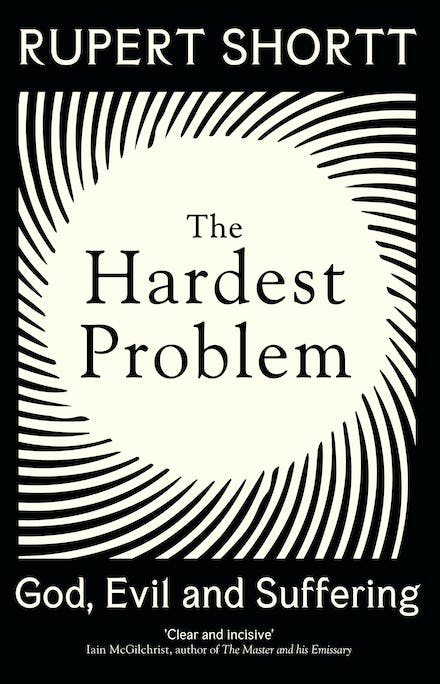Review: The Hardest Problem: God, Evil and Suffering by Rupert Shortt

Tragedies such as the earthquake in the Middle East or the Ukraine war should and do prompt questions, both within and outside religions, about why God allows suffering. And it’s not just big events – genocides and pandemics – that should get us asking questions. The death of a child, cruelty, injustice – all may make us wonder why an all-loving and all-powerful God would create such a world.
For some materialists, this is just the way of nature, ‘red in tooth and claw’. Some Christians may argue, reading too literally, that it all goes back to Adam and Eve and the choice they made, but this only prompts the further question of why God allowed them to make such a dumb choice in the first place. Theologians and philosophers argue whether evil is just the inevitable flipside of having free will. Christian philosopher Richard Swinburne argues that a world where God curtails our ability to do evil would be a ‘toy world’, whereas a real world involves moral freedom, despite the obvious downside. Terry Eagleton writes of Swinburne’s argument, ‘It is hard to imagine anyone but an academic proposing such a case.’
Some serious thinkers have struggled with explanations, showing how hard the problem is. Irenaeus thought that suffering exists because God expects us to clear certain moral hurdles. Aquinas argued that order must entail good and bad, and because God wants to give us life, we must just accept that pain comes along with it. Rabbi Jonathan Sacks thinks that improvement can only come from a state that is flawed. Benedict XVI said that dependence must entail the possibility of loss, hence pain. Matthew McConaughey, less well-known as a philosopher, said pain is good because it makes us stronger. It’s hard to see how any of this explains the Holocaust. Calvin, somewhat shrugging his shoulders, suggested that the point of suffering may only be revealed at the end of time.
An Eastern religion such as Buddhism argues that suffering is illusion. Some philosophers have suggested that our talk of evil and pain and the way we understand God to be working in the world has a problematic ‘grammar’. But it’s hard to argue to a terminal cancer patient that they are just thinking about it the wrong way.
Rupert Shortt argues that we can make a case for the co-existence of God and evil, and that ‘classic church teachings’ are compelling. Rather than just Christianity being on defensive ground, he argues that while Christians should take seriously the arguments of atheists, atheists too must explain why in their worldview life is not completely meaningless and cruel. (A minority, such as John Gray, come close to admitting that it is meaningless and cruel.) Atheists often point to science, but science has not given us definitive explanations for the universe’s origin or why we seek meaning. Shortt is quite taken by the writings of Iain McGilchrist, who has shown through his studies of the left and right brain that we need both logic and intuition, and who further argues that there is richness in religion that we can’t find on our own.
This still leaves the problem of evil in the world. Shortt takes from C S Lewis the caution that we shouldn’t be quick to justify suffering, but Lewis’s analysis of how God uses pain still seems problematic. Its existence may be ultimately inexplicable, like quantum physics or the popularity of Ed Sheeran. There are various, largely inadequate, ways to think about it. Maybe the free will argument is somewhat valid. Maybe the possibility of great happiness or achievement must be balanced by the possibility of great suffering and failure, much like in physics there is a law about the conservation of energy. Teilhard de Chardin suggested, more or less, that it’s hard to imagine what a perfect world would look like. A balance of success and failure might make sense in the context of some of nature, but much human suffering seems pointless and extreme. Maybe, instead, much like the way the physical universe seems to have a direction in the sense of stars and galaxies clumping together, the moral universe is heading for perfection, something suggested in Christian eschatology.
Shortt likes this and then focuses on the practice of Christianity, and the point of the incarnation and atonement. He argues, again tackling the problem side-on, that prayer is not about changing God’s mind, but opening up the possibility within believers of doing good. (This, though, may not be how most people think about prayer.) The atonement, similarly, is not about placating God, but more like God accepting the world’s wrath, in order to restore the world to its good purpose. This may seem reasonable to some; for others it may be simply avoiding the key question of why it needs restoration in the first place.
It’s interesting that in Europe in the Middle Ages the level of faith was high, even though there was much suffering. (Atheists might argue that they didn’t have science to rely on.) In modernity, atheism, or at least lack of religiosity, is becoming more of a default position, especially amongst the better-off. This might suggest that it is not suffering but independence that makes us reject religion. Jesus said his message was not for the well-off but for those at the margins, as Shortt calls them.
In Jesus’ ministry, we don’t see philosophical justifications for suffering. Rather, Jesus insists that stuff just happens. But this is not indifference. We see instead a focus on suffering in the sense of doing something about it, to the point of self-sacrifice. A feeling that suffering can’t be right, that it can’t be the purpose of the world, leads to radical activism, amongst Jesus, his disciples and later Christians. One thing that marked the early church as odd, to their contemporaries, was their work amongst the poor, and this has been a mark of Christians ever since. The point, to paraphrase Marx, is not to understand suffering but to alleviate it.
Nick Mattiske blogs on books at coburgreviewofbooks.wordpress.com and is the illustrator of Thoughts That Feel So Big.













